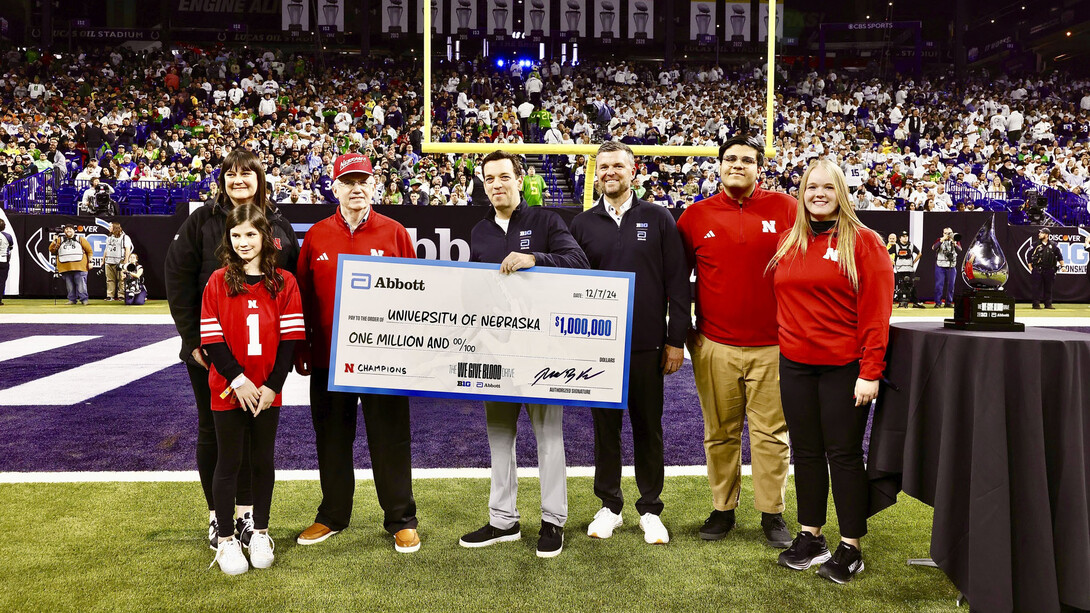
Months after Husker Nation rolled up its sleeves to win Abbott’s inaugural Big Ten “We Give Blood” competition, the University of Nebraska–Lincoln is turning its $1 million prize into multiple lifelines for students.
Immediate impacts are being made this fall through the university’s new Well-being Collective, a cross-campus group convened by Campus Recreation and made up of representatives from Dining Services, Counseling and Psychological Services, Student Advocacy and Support, CARE, Housing, and other student-focused units within the Division of Student Life. A complete list of members is below.
The collective is using $450,000 of the Abbott award to support three major initiatives: hiring a full-time well-being coordinator focused on financial literacy; launching the Abbott Access Fund to eliminate small financial barriers; and funding a series of student-led programs that address physical and emotional well-being.
“This is our chance as a university to focus upstream — to use these funds to prevent problems before they become crises for our students,” said Amy Lanham, director of Campus Recreation and chair of the collective's steering committee. “These dollars are giving us room to be innovative in how we support student well-being.”

Huskers are encouraged to donate blood and log their donations to count toward Nebraska's total in the 2025 We Give Blood campaign through Dec. 5. Nebraska won the friendly contest and the $1 million prize from Abbott in 2024. As of the evening of Sept. 16, Nebraska is in second place with 2,292 donations in the 2025 contest. Wisconsin leads the Big Ten with 3,221 donations. Learn more about the contest and how to help register your blood donation here.
____________________________________________________
The new well-being coordinator position, funded for two years, will unify the university’s financial wellness efforts and serve as a key resource for peer financial well-being ambassadors. The role is intended to help students proactively plan for costs like tuition, housing and food — rather than facing emergency financial stress in the semester.
The Abbott Access Fund, modeled after a similar program at Colorado State, provides students with flexible support for expenses that often fall outside traditional financial aid. Enrolled students can request help for needs such as a bike-share pass, transportation to an airport, intramural team fees or limited dining dollars.
“The fund is intended to cover small, often overlooked financial barriers that can derail a student’s experience,” Lanham said. “Whether it’s $20 for a bus pass or help covering a student org fee, these are the moments where a little support can make a big difference.”
The goal is to reach up to 1,000 students. Applications for the fund are expected to open during Homecoming Week, beginning Sept. 29. To preserve financial aid eligibility, funds awarded are paid directly to service providers, not students.
An additional $150,000 of the Abbott prize is supporting student-led, campus-unit-submitted programs related to physical and emotional health.
Fourteen proposals were submitted for the funding and up to nine programs are expected to be funded. Ideas include cooking classes, peer support training, Husker Hope boxes filled with mental health resources, and funding for off-campus psychiatric services not covered by student insurance.
Selected programs will be announced soon.
The remaining $550,000 of the Abbott award will be allocated through the university’s Healthy Nebraska initiative and a new round of Student Health and Well-being grants. Grant applications are currently being reviewed by the Division of Student Life in collaboration with the Office of Research and Innovation.
Grant projects awarded funding will be announced in the coming months.
Lanham said a key goal of the collective effort is to ensure the support reaches students where they are, whether they need a $25 bike pass or long-term financial education.
“What I’m most excited about is that this gives us a chance to show care — not just in words, but in action,” Lanham said. “This is about helping Huskers feel supported and set up for success in every part of their college journey.”
The “We Give Blood Drive” campaign was a conference-wide effort launched by Abbott and the Big Ten to help address the nation’s critical blood shortage and engage younger donors. More than 20,000 students, alumni and fans across the country participated in 2024, with Nebraska coming out on top and earning the $1 million prize.
The next round of the “We Give Blood Drive” is being held currently as part of the 2025 Big Ten football season. Learn more about the campaign and how to participate here.
Well-being Collective
Members of the University of Nebraska–Lincoln's new Well-being Collective and the Student Life areas they represent are:
- Josh Overocker, senior team liaison, Student Life
- Amy Lanham, steering committee chair, Campus Recreation
- Jon Gayer, Alcohol and Other Drug Programs
- Britt Otte, University Health Center
- Sarah Frankel-Russell, Student Advocacy and Support
- Steve Woita, Campus Recreation
- Ellyn McCarter, Dining Services
- Kenji Madison, Jackie Gaughan Center
- Matt Nelson, University Housing and Residential Life
- Melissa Wilkerson, Center for Advocacy, Response and Education
- Tricia Besett-Alesch, Counseling and Psychological Services
- Veronica Riepe, Student Leadership, Involvement and Community Engagement







